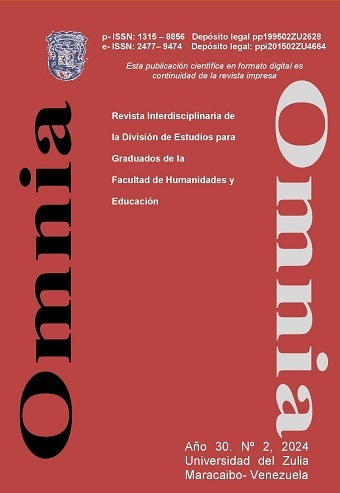Genealogical method and triangulation interdisciplinary
Abstract
The genealogical method in interdisciplinary triangular perspective arises as a theoretical-methodological contribution of the doctoral research entitled: "Genealogies of governmentality in the construction of the other in the context of modernity" of the Doctoral Program in Human Sciences of the University of Zulia. It includes two axes and three dimensions of interpretative analysis and presentation of results, considering as inspiration some guidelines and categories of Michel Foucault's philosophical project. It is made up of an archaeological analysis axis and a genealogical interpretation axis. In the first, the discourse is privileged and two dimensions of descriptive analysis are articulated: the anthropological and the philosophical with the purpose of revealing part of the discursive formations from which the other is constructed in modernity. In the second, the hermeneutic dimension is articulated, as the third part of this method in which the interpretation of the results and findings of this research converge. Concepts such as archaeology, genealogy, discursive formations, modernity, archives, knowledge, power, hierarchies, territory, heterarchies, governmentality, among others, converge in the broad theoretical constellation that Foucault developed throughout his career that is worth understanding from the beginning. own senses that the author built, but situating them in Latin American modernity. It is intended as a result of the application of this method an analysis of the narratives of governmentality from where the other is constructed as an unequal difference in the context of modernity
Downloads
References
Dussel, Enrique (1995). 1492 El Encubrimiento del Otro. Hacia el ori-gen del mito de la modernidad. La Paz, Bolivia. Plural Editores. p. 13-38.
Foucault, Michel (2006). Seguridad, Territorio, Población. Primera Edición en Español. Traducción Horacio Pons. México DF. Méxi-co. Fondo de Cultura Económica. p. 66-78.
____________ (2002). Vigilar y Castigar. Nacimiento de la prisión. Segunda edición. Traductor: Aurelio Garzón del Camino. Buenos Aires, Argentina. Siglo XXI Editores. p. 14-89.
______________ (1997). La arqueología del saber. Décima octava edición, Traductor: Aurelio Garzón del Camino. México DF. Siglo XXI Editores. p. 55- 100.
_____________ (1977). La verdad y las formas jurídicas. Segunda Edición. Traducción de: Elsa Cecilia Frost. México DF. México. Siglo XXI Editores. p. 29-56.
_____________ (2008). Defender la sociedad. Cuarta edición. Traduc-tor: Horacio Pons. México DF. México. Fondo de Cultura Econó-mica. p.124-175.
____________ (1976). Las palabras y las cosas. Una arqueología de las Ciencias Humanas. Séptima edición. Traductora: Elsa Cecilia Frost. México DF. México. Siglo XXI Editores. p. 19- 77.
_____________. (2007). Nacimiento de la Biopolítica. Curso en el Co-llege de France (1978-1979). Traductor: Horacio Pons. Buenos Aires, Argentina. Fondo de Cultura Económica. p. 13 -97.
Santos, Boaventura De Sousa (2003). Crítica de la razón indolente. Contra el desperdicio de la experiencia. Primera Edición. Volu-men I. Rua Monte Alegre, Brasil. Cortez Editora. p. 31.
___________ (2006). La Sociología de las Ausencias y la Sociología de las Emergencias: para una ecología de saberes; en: Renovar la teoría crítica y reinventar la emancipación social (encuentros en Buenos Aires). Disponible en: http://bibliotecavirtual.clacso.org.ar/ar/libros/ edi-cion/santos/Capitulo%20I.pdf www.clacso.orghttp://www.clacso.org-.ar/biblioteca.
Ricoeur, Paul (2002). Del texto a la acción. Ensayos de hermenéutica II. Segunda Edición, Traductor Pablo Corona. México DF. Méxi-co. Fondo de Cultura Económica. p. 14-54.
Zea, Leopoldo (1979). Filosofía de la Historia Americana. Primera Edi-ción. México DF. México. Fondo de Cultura Económica. p. 18- 280.





